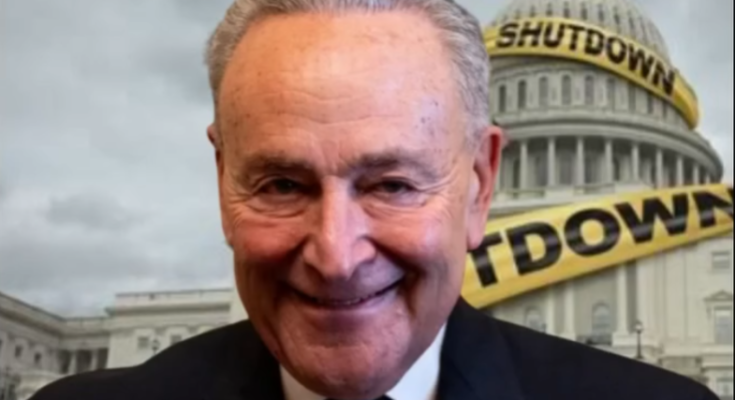BREAKING: Mike Johnson Reveals Chuck Schumer demanded $4 million


House Speaker Mike Johnson revealed on Tuesday that Democrats are demanding billions in wasteful and ideological spending, including $3.9 million for LGBTQI+ democracy grants in the Western Balkans, as part of their conditions to reopen the government.

Speaking on the 14th day of what he called the Democrat government shutdown, Johnson said the American people are suffering because Democrats have chosen politics over responsibility.
“Welcome to day 14 of the Democrat government shutdown,” Johnson said during his press briefing. “It’s two weeks of Democrats in Congress inflicting untold pain on the American people for nothing other than pure politics.”
Johnson explained that House Republicans had already offered a clean continuing resolution to keep the government funded, but Democrats repeatedly rejected it.
Instead, he said, Democrats are tying unrelated left-wing priorities to essential government operations in an attempt to strong-arm Republicans into approving radical spending measures.
He accused Senate Minority Leader Chuck Schumer of catering to what he described as the party’s “Marxist base.”
The Speaker laid out details from the Democrats’ counterproposal, calling it a $1.5 trillion wish list of reckless spending that would send taxpayer money to liberal causes and foreign projects that have nothing to do with running the U.S. government.
Among the examples he cited were $24.6 million for climate resilience programs in Honduras.
Another $13.4 million would go to civic engagement programs in Zimbabwe.
An additional $2.9 million is earmarked for desert locust risk reduction in the Horn of Africa.
The Democrats’ plan also calls for $2 million to fund “organizing for feminist democratic principles” in Africa, according to Johnson.
Johnson highlighted the $3.9 million in LGBTQI+ democracy grants for the Western Balkans as an example of Democrats’ misplaced priorities.
“They want to spend 3.9 million of your hard-earned dollars for LGBTQI+ democracy grants in the Western Balkans,” Johnson said. “We are not doing that.”
He argued that Democrats are also trying to undo common-sense reforms enacted by Republicans that prevent illegal immigrants from accessing taxpayer-funded healthcare.
“This is a fact,” he said. “They would add illegal aliens and non-citizens back to taxpayer-funded benefits. It would cost taxpayers nearly $200 billion.”
Johnson further warned that Democrats want to roll back modest work requirements placed on able-bodied young men without dependents.
At the same time, Democrats are pushing to make COVID-era Obamacare subsidies permanent, with no income limits or meaningful reforms.
Johnson said this approach would not only punish working Americans but also reward dependency and mismanagement.
The Speaker accused Democrats of prioritizing ideological projects over the immediate needs of the American people.
He said their proposal exposes how out of touch the party has become, highlighting spending for causes abroad while Americans face uncertainty at home.
“This is not about keeping the lights on,” Johnson said. “This is about Democrats trying to use the shutdown as leverage to fund their far-left agenda.”
Johnson reminded reporters that Republicans have already passed legislation to reopen the government responsibly, without any of the unrelated political riders Democrats insist on including.
The Republican plan, he said, would maintain government operations, protect taxpayers, and prevent wasteful spending abroad.
Johnson also pointed out that the Democrats’ proposal would restore funding to the Corporation for Public Broadcasting, sending a half-billion dollars to what he described as liberal media outlets that have long benefited from taxpayer subsidies.
He described it as another example of Democrats using government funding to reward their political allies rather than serving the public good.
“These are not the priorities of the American people,” Johnson said firmly. “They are the priorities of a radical political class that has forgotten who they work for.”
The Speaker ended his remarks by calling on Democrats to stop the political games and join Republicans in reopening the government immediately.
“We have a clean bill ready to go,” he said. “It keeps the government open, pays our troops, secures the border, and protects hardworking taxpayers. Democrats need to stop holding America hostage.”
Johnson’s comments reflect growing frustration among House Republicans who say Democrats are using the shutdown to push through spending on social experiments, foreign projects, and activist groups under the guise of government funding.
He warned that such spending will only deepen America’s fiscal crisis and fuel public anger toward Washington’s political class.
“This is a moment for leadership,” Johnson concluded. “It’s time to put the American people first and end this shutdown—not by giving in to woke demands, but by standing firm for fiscal sanity and common sense.”
Karoline Leavitt Confronts Reporters, Defends Trump Immigration Policy in Heated Week at the White House
Washington, D.C. — White House Press Secretary Karoline Leavitt has once again found herself at the center of headlines after a tense exchange with reporters during a recent press gaggle. The incident underscored the continuing friction between the Trump administration and members of the press while also highlighting the administration’s renewed push on immigration enforcement.
The confrontation unfolded at the Stakeout Location outside the White House, where reporters had assembled to question Middle East envoy Steve Witkoff and National Security Advisor Michael Waltz on a series of foreign policy developments. As the officials attempted to field questions, the scene quickly grew chaotic, with multiple reporters shouting over one another.
Stepping forward to restore order, Leavitt admonished the group:
“Guys, please. Let’s act like adults here. They are generously offering their time to answer your questions. You don’t need to scream at them like a bunch of school children.”
The moment was brief but pointed, encapsulating Leavitt’s trademark style — firm, direct, and unapologetic. It also drew immediate reactions across the political spectrum, with supporters praising her no-nonsense approach and critics accusing her of trying to silence a free press.
A Rising Figure in Trump’s Inner Circle
Leavitt, at just 27 years old when she assumed the role of Press Secretary, is one of the youngest individuals ever to hold the position. Her rise has been rapid, propelled by her sharp communication skills, deep loyalty to Trump, and her willingness to spar with the press corps in ways that echo the combative style of her predecessors, such as Sarah Huckabee Sanders and Kayleigh McEnany.
Supporters within the administration describe her as a “fighter” who understands that in the Trump era, the press briefing room is not merely a venue for information but a stage for political messaging.
“She has a way of cutting through the noise,” one senior official remarked. “The president trusts her because she doesn’t flinch when the media goes on the offensive. She’s tough, and that’s exactly what this role requires.”
For her critics, however, Leavitt embodies what they see as a troubling trend of dismissing legitimate journalism as hostility. They argue that her sharp rebukes undermine the role of the press in holding the government accountable.
Immigration Flights to Guantanamo Bay
The gaggle scolding was not Leavitt’s only headline of the week. Earlier, she confirmed that the administration had begun transporting illegal immigrants to Guantanamo Bay, a move that sparked both applause and outrage.
During an appearance on Fox Business, Leavitt described the flights as part of Trump’s broader effort to “restore law and order” on the border and throughout the interior of the country.
“He’s no longer going to allow America to be a dumping ground for illegal criminals from nations all over this world,” Leavitt told host Stuart Varney.
She revealed that Venezuela and Colombia had agreed to cooperate with the repatriation process, sending back their citizens who were found to be in the U.S. illegally and convicted of crimes. According to her, the flights had already begun and represented a “new phase” in immigration enforcement.
The policy has divided opinion sharply. Supporters argue it sends a powerful message that the U.S. will no longer tolerate what Trump has repeatedly called “catch and release.” Critics, however, contend that sending detainees to Guantanamo Bay is heavy-handed and risks international condemnation.
Responding to Political Rivals
Leavitt also took aim at New Jersey Governor Phil Murphy, who recently walked back comments suggesting that he would be willing to house an undocumented immigrant in his own home.
“I will say that this administration will hold Democrat governors and leaders across the country accountable if they break the law, if they harbor illegal aliens, or if they are not abiding by the federal immigration laws,” Leavitt declared.
Her remarks reflect a broader communications strategy — painting Democratic governors as out of touch with everyday Americans while portraying Trump’s administration as the defender of law, order, and sovereignty.
Tensions With the Press: A Recurring Theme
The sharp exchange with reporters fits into a larger pattern of confrontations that have defined Trump-era press relations. From Trump’s frequent denunciations of “fake news” to now Leavitt’s no-nonsense policing of press behavior, the administration has consistently framed itself as embattled by a hostile media establishment.
Historians point out that tension between presidents and the press is nothing new. Richard Nixon famously maintained an enemies list of journalists; Ronald Reagan bypassed traditional media by using carefully staged television events; and Barack Obama drew criticism for aggressively pursuing leakers within the government.
Yet Trump’s White House has taken that tension to a new level, with daily briefings often serving as political theater. Leavitt has embraced that role, stepping into the spotlight as both spokesperson and defender of the president.
Political Stakes Ahead
The timing of Leavitt’s confrontations is critical. As Trump seeks to solidify support for his second-term agenda, immigration remains one of the most potent issues with his base. Policies like the Guantanamo Bay flights are designed not just as enforcement tools but as political signals, reinforcing Trump’s brand as a leader who delivers on tough promises.
At the same time, Democrats are seeking to frame the administration’s approach as excessive and authoritarian. By leaning into the image of toughness, Leavitt risks alienating moderates who may prefer a more measured tone on immigration and press relations.
But within Trump’s circle, there is little doubt that Leavitt is doing precisely what is expected of her. Her willingness to clash with reporters plays well among supporters who see the press as biased, while her defense of controversial policies strengthens her standing as one of Trump’s most loyal communicators.
A Balancing Act for the Future
The question now is whether Leavitt can maintain her combative style without burning bridges that the administration may need in moments of crisis. Press secretaries, after all, often serve as the face of the White House during national emergencies, where credibility and calm delivery are paramount.
For now, however, Leavitt seems content to continue her role as a fighter in the daily battles that define Washington. Whether addressing policy, challenging reporters, or amplifying Trump’s message, she has cemented herself as a central figure in the administration’s communications machine.
Conclusion
Karoline Leavitt’s scolding of reporters may have been a small moment in an otherwise busy news cycle, but it reflected something much larger: the Trump administration’s approach to media, politics, and governance. It was about asserting control in a chaotic setting, defending controversial policies, and reminding the press — and the public — that this White House intends to play by its own rules.
For Leavitt, the week demonstrated both the opportunities and challenges of her role. She is not merely a spokesperson; she is a combatant in the political arena, wielding words as weapons and using confrontation as a tool. As immigration policy and media relations continue to dominate the national conversation, her voice will remain one of the loudest and most contentious in Washington.
Tsunami sirens were activated in places like Kodiak, as shown in a video obtained by Reuters. The US National Tsunami Warning Center (NTWC) issued alerts for southern Alaska and coastal areas from Hinchinbrook Entrance to Unimak Pass.watch below
Hawaii and Guam were initially warned but later declared safe. Alaska Governor Mike Dunleavy confirmed the activation of the state’s emergency operations center. The Pacific Tsunami Warning Center and other national
agencies, including those in Japan and New Zealand, began assessments for potential threats. The USGS reported at least eight aftershocks, two exceeding magnitude 6.0




